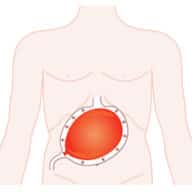
Dyspepsia

Summary
Nearly everyone has had indigestion at one time. It’s a feeling of discomfort or a burning feeling in your upper abdomen. You may have heartburn or belch and feel bloated. You may also feel nauseated, or even throw up.
You might get indigestion from eating too much or too fast, eating high-fat foods, or eating when you’re stressed. Smoking, drinking too much alcohol, using some medicines, being tired, and having ongoing stress can also cause indigestion or make it worse. Sometimes the cause is a problem with the digestive tract, like an ulcer or GERD.
Avoiding foods and situations that seem to cause it may help. Because indigestion can be a sign of a more serious problem, see your health care provider if it lasts for more than two weeks or if you have severe pain or other symptoms. Your health care provider may use x-rays, lab tests, and an upper endoscopy to diagnose the cause. You may need medicines to treat the symptoms.
NIH: National Institute of Diabetes and Digestive and Kidney Diseases
Source: MedlinePlus, National Library of Medicine.
Information pulled from the Indigestion page.
MedlinePlus brings together authoritative health information from the National Library of Medicine (NLM), the National Institutes of Health (NIH), and other government agencies and health-related organizations.
Indigestion (Dyspepsia)
National Institute of Diabetes and Digestive and Kidney Diseases
Indigestion (Dyspepsia)
American Academy of Family Physicians
Chamomile
National Center for Complementary and Integrative Health
Peppermint Oil
National Center for Complementary and Integrative Health
Sage
National Center for Complementary and Integrative Health
Listen to our
latest Podcast!








